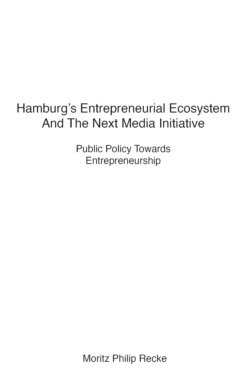Читать книгу Hamburg's Entrepreneurial Ecosystem And The Next Media Initiative - Moritz Philip Recke - Страница 16
На сайте Литреса книга снята с продажи.
3.3 Startup Activities in Hamburg
ОглавлениеThe privately operated initiative Hamburg Startups developed the “Hamburg Startup Monitor”, closely reporting on startup activities within the Hamburg metropolitan area. Unfortunately only “live” data is available on the website, so no insights into recent changes or historic developments within the entrepreneurial ecosystem can be obtained.
This is due to the fact that the “Hamburg Startup Monitor” has only gathered data for a short period of time, starting in 2015 (Jensen 2016). Still the data points gathered provide a convenient way to dive into Hamburg’s entrepreneurial ecosystem and its startups.
Figure 9: Category of startups monitored by Hamburg Startup Monitor
With more than 430 businesses on report in April 2016, the ecosystem is growing continuously with the most prominent startup categories being Commerce, Services and Media (nextMedia.Hamburg 2016b). In November 2016, more than 580 startups (see fig. 9) are on record on the website (Hamburg Startups 2016).
Lines between the startup categories might be blurry, since a fashion startup might also qualify as commerce startup and a FinTech startup might also qualify as a service startup. Especially with categories such as tech it might be very difficult to indicate a correct representation of the startup.
In addition, since it is self reported data from startups, the categorisation might be incorrect or could change if the startup’s perception of itself changes over time. Still the data provides some indication of what industries the startups within Hamburg’s entrepreneurial ecosystem are related to.
In terms of the individual business models pursued by Hamburg based startups the Hamburg Startup Monitor provides some insights as well. The most dominant business models for regional startups are subscriptions (freemium, subscription, SaaS), direct sales, commerce, commissions and advertising (see fig. 10).
Figure 10: Business model pursued by startups monitored by
Hamburg Startup Monitor
In regards to being closely related to media industry business models, the categories subscriptions, commissions and advertising seem highly attractive to established media industry value chains.
As illustrated before, startups may evolve very dynamically. They can rise and perish in the period of just very few months or even weeks. Therefore information about the age of local startups might provide a way to indicate both health of the entrepreneurial ecosystem in general and longevity of business ideas pursued by startups within in.
Based on the data available, 165 startups have been funded in 2015, 146 in 2014 and 75 in 2013 (see fig. 11), indicating either an increasing number of startups funded per year or a rather short lifespan of startups on report.
Figure 11: Founding year of startups monitored by Hamburg Startup Monitor
Ruffly half of all listed startups are in the “startup stage”, more than 150 are in the “later stage” and more than 100 are in the “seed stage” (see fig. 12). Interestingly more than 120 startups made no indication to their stage of development, indicating either a lack of expertise to categorise the startups stage or refusal to participate in efforts to create transparency within Hamburg’s entrepreneurial ecosystem.
Figure 12: Startup stage of startups monitored by Hamburg Startup Monitor
Combined with the startups’s age, interesting key performance indicators (KPIs) could be established over time. It might be interesting to monitor not only how many firms exist for how long, but how long it took them to reach certain stages of development.
Combined with data on business models and funding this could be extended to analysing how long it takes certain startups with specific business ideas under given funding conditions to reach a certain stage. Unfortunately despite historic data not being available yet, the necessary data on startup funding in Hamburg is not reported and might in fact be hard to obtain in a credible manner.
Figure 13: Number of employees by industry in startups monitored by Hamburg Startup Monitor
Other interesting data points collected by the Hamburg Startup Monitor show how many jobs are “created” by Hamburg based startups, 5460 as of November 2016 (see fig. 13). If historic data were available in the future, this might help to evaluate startups’ potential for job creation, one of the main arguments behind many innovation policy agendas promoting entrepreneurship around the globe.
To assess this data objectively it would be necessary to verify these numbers with official employment data provided by municipal government. In addition it might be prudent to evaluate employment statistics in related industries to survey wether certain jobs might be “destroyed” or “displaced” by innovative business ideas. Again this might be difficult to do since necessary data is unavailable but would be relevant to assess the impact of entrepreneurial activity on economic growth and job creation in Hamburg.
